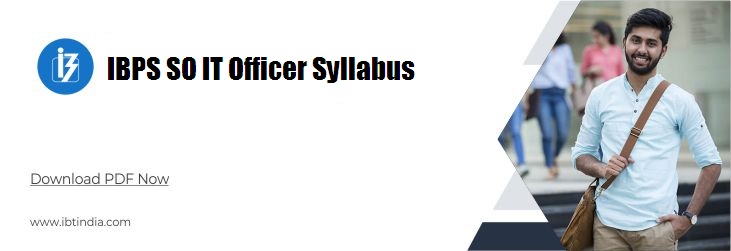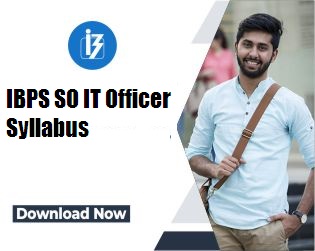IBPS SO IT Officer Syllabus - Download PDF
The students preparing for the IBPS SO IT Officer post usually look for its syllabus on different types of platforms. On this blog you will surely get all types of reliable information about the IBPS SO IT Officer exam. Every year the Institute of Banking Personnel Selection (IBPS) announces vacancies for the IBPS SO IT Officer (Scale-I). If you aspire to enter the banking sector, then IBPS SO IT officer job is perfect for you. Before commencing your preparation journey you should be well versed with the latest syllabus of the IBPS SO IT Officer.
IBPS SO IT Officer Syllabus for 2022
To qualify the IBPS SO 2022 exam, you must be familiar with the exam pattern and the full syllabus. Those preparing for the next IBPS SO 2022 exam can benefit from this information. Aspirants hoping to land a job as a Specialist Cadre Officer at a Public Sector Bank have been given a detailed breakdown of the IBPS Specialist Officer exam syllabus in this post.
Exam Pattern for IBPS SO IT Officer (Scale-I)
The IBPS SO IT officer 2022 exam will surely be conducted in the three stages: Preliminary Exam, Mains exam and Interview section. It is highly important for the individual to surpass all the three stages to sit on the paramount seat of the Specialist Officer in multiple Public Sector Banks. Here you will get the right exam pattern for the IBPS SO IT officer examination.
IBPS SO IT Officer Prelims Exam Pattern
For the Post of Agriculture Field Officer IT Officer Scale I
|
S. No. |
Section |
No. of Questions |
Total Marks |
Duration |
|
1. |
Reasoning |
50 |
50 |
40 min |
|
2. |
English Language |
50 |
25 |
40 min |
|
3. |
Quantitative Aptitude |
50 |
50 |
40 min |
|
Total |
150 |
125 |
120 min |
IBPS SO IT Officer Mains Exam Pattern
For the Post of IT Officer Scale I
|
Name of Test |
Number of Questions |
Maximum Marks |
Medium of Exam |
Duration |
|
Professional Knowledge |
60 |
60 |
English & Hindi |
45 min |
IBPS SO IT Officer Syllabus 2022 PDF Download
The entire syllabus of the IBPS SO is truly divided into two major parts. The first one is Prelims and the second one is Mains exams. IBPS SO IT Officer syllabus will surely help you stay updated while preparing for this exam.
Prelims Exam Syllabus of IBPS SO IT Officer (Scale-I)
Consider checking out the below mentioned syllabus so that you can come to know about the latest syllabus in the limited duration of time.
|
Reasoning Ability |
Quantitative Aptitude |
English Language |
|
Logical Reasoning |
Simplification |
Reading Comprehension |
|
Alphanumeric Series |
Profit & Loss |
Cloze Test |
|
Ranking/Direction/Alphabet Test |
Mixtures & Alligations |
Para jumbles |
|
Data Sufficiency |
Simple Interest & Compound Interest & Surds & Indices |
Multiple Meaning / Error Spotting |
|
Coded Inequalities |
Work & Time |
Fill in the blanks |
|
Seating Arrangement |
Time & Distance |
Miscellaneous |
|
Puzzle |
Mensuration – Cylinder, Cone, Sphere |
Paragraph Completion |
|
Tabulation |
Data Interpretation |
|
|
Syllogism |
Ratio & Proportion, Percentage |
|
|
Blood Relations |
Number Systems |
|
|
Input-Output |
Sequence & Series |
|
|
Coding-Decoding |
Permutation, Combination Probability |
Mains Exam Syllabus of IBPS SO IT Officer (Scale-I)
1. Operating System
Simple Batch Systems, Multi Program batch systems, Time-Sharing Systems, Process Concepts and PCB, Process Scheduling, Schedulers, and Context Switching, Interprocess Communication, CPU Scheduling, Scheduling Criteria, Scheduling Algorithms- FCFS, SJFS, Priority Scheduling, Round-Robin Scheduling, Multilevel Queue Scheduling, Multilevel Feedback Queue Scheduling, Multiple-Processor Scheduling, Real-Time Scheduling, The Critical Section Problem, Semaphores, The Dining Philosophers Problems, Critical Regions, Deadlock- Prevention, Avoidance, Detection, Recovery, Bankers Algorithm, Memory Management, Logical Vs Physical Address Space, Segmentation, Virtual Memory, Demand Paging, Page Replacement Algorithms- FIFO, Optimal Algorithm, LRU, Second Change; Counting Algorithm, Thrashing.
2. Data Structure
Asymptotic Notation, Stacks and Queues, Trees, Algorithms, Binary Trees, Lemma, Heaps and Heapsort, Minimum Spanning Trees, All pair shortest path, Optimal Binary Search Trees, Tree Traversal, Graphs- Search and Traversal techniques, Sorting- Insertion Sort, Selection Sort, Radix Sort, Merging, Complexity of Sorting and Merging Algorithms, Hashing, Chaining, PASCAL, Looping, Break and continue statement, Functions.
3. Object-Oriented Programming
Java Basics (History of Java, data types, variables, scope and lifetime of variables, arrays, operators, expressions, control statements, type conversion and casting, simple java program, concepts of classes, objects, constructors, methods, access control, this keyword, overloading methods and constructors, parameter passing, recursion, nested and inner classes, exploring string class), Inheritance, Polymorphism, Encapsulation, Packages and Interfaces, Exception Handling, Multithreading, Event Handling, Applets.
4. Database Management Systems
Database models, File Management System VS DBMS, Tuple Relational Calculus, Normal Forms, Data-Structure Diagrams, ER Diagram, SQL Basics, Transaction Control.
5. Compiler Design/ Language Processor
Assemblers, Compiler structure, Lexical Analyser, Parsing, Buffer pairs, syntax error handling, Parse tree and derivation, grammar, bottom-up parsing, LR Parsing, Syntax tree, Storage Organization, macro instructions, macro processor, loader, linker, interpreters.
6. Computer Organization
Number System, Arithmetic Addition and subtraction, Overflow Detection, Decimal Fixed Point Representation, Floating Point Representation, Gray Code, Weighted Code, Excess-3 Code, Error Detection Codes, Parity Bit, Odd Function, Machine Language, Addressing Modes, Program Counter, CPU, General Register Organization, Control Word, Microprogrammed Control, Data Dependency, Memory Organization, Cache, Mapping.
7. Microprocessor and Computer Hardware
Microprocessor Architecture and its operations, 8085, 8080A, Bus Organisation, Registers, Accumulator, Stack Pointer, Memory Classification, Flip Flop, R/W Memory, ROM, RAM, 8085 Control and Status Signals, Power Supply and Clock Frequency, Logical Operations, Instruction Format, Stacks, Subroutine, Interrupts, Programmable Interrupt Controller, Interrupt Operation, Ladder Network, D/A Converters, Multiplexer De-multiplexer, Digital Comparator, Parity Generator/Checker, Flip Flop, Ring Counter, Ripple Counter, Up/Down Counter, Synchronous Counter.
8. Computer Network
Reference Models, OSI and TCP Models, Data Transmission, Transmission Medium, IEEE Standards, and Protocols- 802.3, 802.4, 802.5, IP Address, NIC, Switching, Networking devices, Internet, Types of Networks.
9. Software Engineering
SDLC (Software Development Life Cycle), Software Configuration Management (SCM), Software Development Models, Requirement Elicitation, Software Design and Maintenance, Software Testing: Testing Objectives, Unit Testing, Integration Testing, Acceptance Testing, Regression Testing, Testing for Functionality and Testing for Performance, Top-Down and Bottom-Up Testing Strategies: Test Drivers and Test Stubs, Structural Testing (White Box Testing), Functional Testing (Black Box Testing), Test Data Suit Preparation, Alpha and Beta Testing of Products.Static Testing Strategies: Formal Technical Reviews (Peer Reviews), Walk Through, Code Inspection, Compliance with Design and Coding Standards.
10. Web Technology
Web Page Designing: HTML: list, table, images, frames, forms, CSS, Document type definition, XML: DTD, XML schemes, Object Models, presenting and using XML, Using XML Processors: DOM and SAX, Dynamic HTML.
Scripting: Javascript: Introduction, documents, forms, statements, functions, objects; introduction to AJAX, VB Script, Introduction to Java Beans, Advantage, Properties, BDK, Introduction to EJB, Java Beans API.
Server Site Programming: Introduction to active server pages (ASP), Introduction to Java Server Page (JSP), JSP Application Design, JSP objects, Conditional Processing, Declaring variables and methods, Sharing data between JSP pages, Sharing Session and Application Data, Database Programming using JDBC, development of javabeans in JSP, Introduction to Servlets, Lifecycle, JSDK, Servlet API, Servlet Packages, Introduction to COM/DCOM/CORBA.
PHP (Hypertext Preprocessor): Introduction, syntax, variables, strings, operators, if-else, loop, switch, array, function, form, mail, file upload, session, error, exception, filter, PHP-ODBC
11. Data warehousing & Data Mining:
Data Warehouse Process and Technology: Warehousing Strategy, Warehouse management and Support Processes, Warehouse Planning and Implementation, Hardware and Operating Systems for Data Warehousing, Client/Server Computing Model & Data Warehousing. Parallel Processors & Cluster Systems, Distributed DBMS implementations, Warehousing Software, Warehouse Schema Design, Data Extraction, Cleanup & Transformation Tools, Warehouse Metadata.
Data Mining: Overview, Motivation, Definition & Functionalities, Data Processing, Form of Data Preprocessing, Data Cleaning: Missing Values, Noisy Data,(Binning, Clustering, Regression, Computer and Human inspection), Inconsistent Data, Data Integration and Transformation. Data Reduction:-Data Cube Aggregation, Dimensionality reduction, Data Compression, Numerosity Reduction, Discretization and Concept hierarchy, generation.
Data Visualization and Overall Perspective: Aggregation, Historical information, Query Facility, OLAP function, and Tools. OLAP Servers, ROLAP, MOLAP, HOLAP, Data Mining interface, Security, Backup and Recovery, Tuning Data Warehouse, Testing Data Warehouse. Warehousing applications and Recent Trends: Types of Warehousing Applications, Web Mining, Spatial Mining, and Temporal Mining.
12. Computer and Network Security
Basic security topics, including symmetric and public-key cryptography, digital signatures, cryptographic hash functions, authentication pitfalls, and network security protocols.
Conclusion
IBPS SO IT Officer's updated curriculum and exam pattern are now available to you. If you're qualified and eager to sit for the exam, contact the IBT institute today. For all government exams, we offer the best training available. With a high success record, IBT is one of the most renowned coaching institutions. Every government exam has its own unique set of examination requirements, which our lecturers are well-versed in. In addition to providing the greatest training, we also offer appropriate study material for government exams. Weekly mock tests are also used to evaluate the students progress and assist them in making necessary adjustments. In order to pass the IBPS SO IT Officer (Scale-I) examination, you must enroll at IBT institute now.

 9696960029
9696960029 Download App's
Download App's
